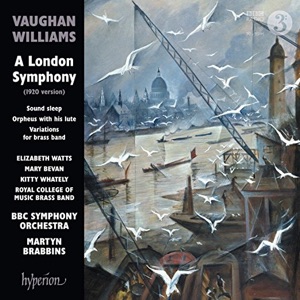No, no, no. This won’t do at all. A London Symphony is a big, beefy, swaggering piece punctuated with intimate, poetic moments. Brabbins clearly understands the latter, but ignores the former. The result is tedium. The BBC Symphony Orchestra, as if anticipating the ordeal to come, turns in a performance that’s note-accurate but strikingly faceless. Adding insult to injury, Brabbins chooses to play the (very) slightly longer 1920 first published version of the work–longer, that is, where the performance is weakest, in the interminably sluggish Lento, which seems to take forever. Never mind the few extra bars: Boult in his last recording clocks in at under ten minutes, while Brabbins takes thirteen. The result is lethal.
But there are issues elsewhere as well. Yes, the scherzo is subtitled “Nocturne,” but the playing lacks the kind of snap and big dynamic contrasts that the music demands–think of those sharp offbeats in the trio section, for example. Throughout, the brass take a back seat to the strings, not usually a bad thing, except at the climaxes, which chronically lack impact. The percussion too sounds as though it has been perched too far off in the distance. Some of those poetic moments, the finale’s coda especially, are quite beautiful, but they would have been even more so placed in the proper context, as islands of tranquility or mystery within the turbulence of the whole.
The two vocal numbers, Sound sleep for female voices and small orchestra, and Orpheus with his lute, are pretty but not important enough to matter. The Variations for band, on the other hand, is quite well done in its original scoring. It’s also better recorded than the symphony, with greater focus and a firmer bass.
A London Symphony is not difficult to play or interpret. I’ve heard community orchestras (including some that I’ve played in) render it quite effectively. All this business about multiple editions may be interesting, but the first order of business ought to be mastering the composer’s final thoughts which, in this case, were certainly best. Absent that, all that remains is gimmickry. Time and again when listening to this performance you’ll find yourself thinking, “Quit screwing around and just play the damn thing!”
Brabbins is beginning to concern me. The great thing about doing rare repertoire is that most of the time your interpretation gets the benefit of the doubt. If Brabbins wants to compete against the big boys, he’ll have to do better than this. Certainly he seems to be recording too much, too quickly, and when the chief selling point is the edition chosen rather than the conductor’s interpretation of it, then we’ve got a problem.
































